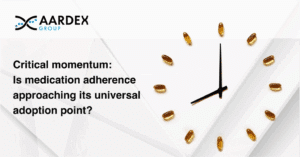Drug giant, Pfizer has highlighted the need for effective, patient-centered medication adherence management in clinical trials.
Nothing stops a drug from working more than not taking it, but, as medicine and leadership pioneer and Pfizer’s Chief Medical Officer, said, non-adherence in clinical trials damages more than the patient.
“It is also corrosive to the integrity of the trial itself. Issues in adherence can mask important safety signals and greatly complicate the execution of the trial,” she said in a statement on the company’s website.1
According to the organization, study participants not adhering to their investigational product regimen leads to an increase in the number of patients required to complete a study, and higher costs linked to site and patient recruitment.
What’s more, it prolongs the time it takes to complete the study and drives up investigational product overage and associated costs.
In a world where conducting clinical trials is becoming more expensive, Pfizer is just one of many large pharma organizations that have recognized that they cannot afford not to manage medication adherence.
That’s why the organization has initiated a challenge for the wider health and research community to submit solutions for the “continuous improvement of investigational product adherence”.
A Scaled-up Problem
Despite the slew of negative consequences associated with people not taking the investigational products as directed, poor adherence during clinical trials is a widespread problem.
The 2020 ESPACOMP Medication Adherence Reporting Guideline (EMERGE) points to a study of 95 studies, encompassing almost 17,000 patients. It found that 4% of participants did not initiate treatment and that 20% has stopped taking the product, against protocol specifications, by day 100. Even among persistent patients, 12% displayed suboptimal implementation.2
This is nothing new. Researchers, academics, and industry have been working to address the issue for decades, but to no avail. A lack of workable monitoring approaches and concise guidance on how adherence should be measured, analyzed, and reported have both proved to be barriers – but progress in both of these areas is now starting to bear fruit.
EMERGE, which provides sponsors and CRO’s with a practical guide on how to measure adherence, is one part of the puzzle. Implementing it, however, relies on access to accurate data on medicine-taking behavior.
Traditional approaches, such as pill count and self-report, are subjective and open to bias while monitoring drug metabolites in blood, urine, or hair, is invasive for patients and burdensome for sites.
Furthermore, the approaches only provide a small line of sight into medicine-taking behaviors, which can mean instances of overdosing and medication holidays can go unnoticed until they develop into more serious issues.
Digital Future
Newer digital approaches have the potential to shift the dial, but sponsors must be sure that the solutions satisfy all of the requirements to make measuring and managing adherence as non-burdensome as it can be.
Pfizer’s “challenge” recognizes both the importance of patient centricity, and that innovations should also allow for the “prediction, assessment, and identification of potential risk factors contributing to clinical trial non-adherence”.
Solutions need to be frictionless for the patient. Anything that necessitates patients’ active involvement, such as recording and uploading videos of themselves taking the product, only serves to erect additional barriers. Adding extra steps alongside an already challenging dosing regimen makes poor adherence more, not less, likely. Instead, data should be collected automatically in the background without requiring regular input from the patient.
We also need to shift our thinking from adherence monitoring to adherence management. It is not enough to simply know if people are taking their medicine. If sponsors want to identify those at risk of poor adherence and give them the support they need to stay on track, they need granular, decision-driving data.
Combining the Powers of Digital
AARDEX combines the power of connected medication adherence packaging and devices with centralized analytics to provide researchers with real-time intelligence on medication-taking behaviors.
Connected pre-filled syringes or blister packs, for example, automatically detect when an injection is administered, or a tablet is removed from the packet. It then transmits that data to a cloud-based platform where it’s analyzed.
Proprietary algorithms spot missed doses or erratic dosing patterns, such as medication holidays, and the platform presents this information to the study team in a series of visualizations, which are accompanied by lists of patients that require stratification. This enables study teams to rapidly identify at-risk patients and deliver individualized interventions.
Studies have shown digital monitoring to be 97% accurate, compared to 60% accurate for pill count, 50% for healthcare professional rating, and just 27% for self-report,3 and, crucially, that it can improve adherence to medication by up to 50%.4
- Pfizer. (2022) Clinical Study Adherence. Available at: https://www.breakthroughchangeaccelerator.com/clinical-study-adherence Last accessed: 20th July 2022
- Eliasson, L., Clifford, S., Mulick, A., Jackson, C., & Vrijens, B. (2020). How the EMERGE guideline on medication adherence can improve the quality of clinical trials. British Journal of Clinical Pharmacology, 86(4), 687-697.
- El Alili, M., Vrijens, B., Demonceau, J., Evers, S. M., & Hiligsmann, M. (2016). A scoping review of studies comparing the medication event monitoring system (MEMS) with alternative methods for measuring medication adherence. British journal of clinical pharmacology, 82(1), 268-279.
- Demonceau, J., Ruppar, T., Kristanto, P., Hughes, D. A., Fargher, E., Kardas, P., … & Vrijens, B. (2013). Identification and assessment of adherence-enhancing interventions in studies assessing medication adherence through electronically compiled drug dosing histories: a systematic literature review and meta-analysis. Drugs, 73(6), 545-562.



